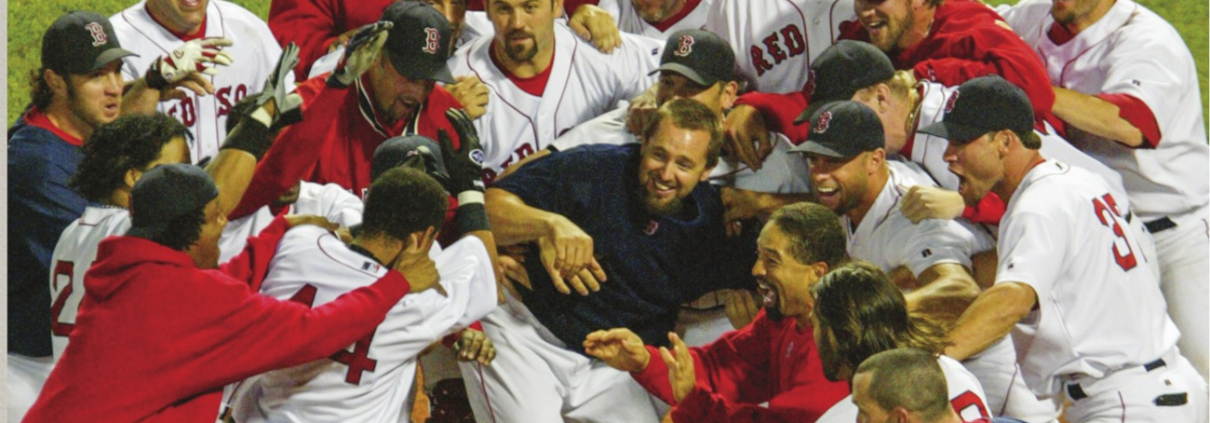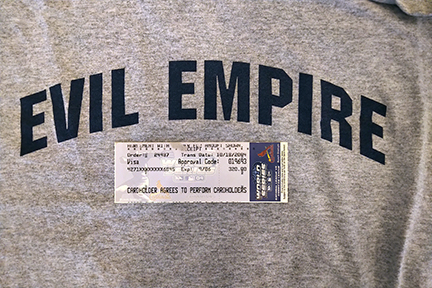A Yankee Fan’s Perspective on the 2004 American League Championship Series
This article was written by Jeb Stewart
This article was published in Sox Bid Curse Farewell: The 2004 Boston Red Sox
Ticket purchase receipt to Game Five of the 2004 World Series — had it been played at Yankee Stadium. (Photo by Jeb Stewart)
Even for a confident Yankees fan (are there any other kind?), the 2003 offseason began with troubling signs. True, Brian Cashman found a way to obtain Alex Rodriguez, who had seemed destined to bolster Boston’s already impressive lineup just days earlier.
However, the losses of starting pitchers Roger Clemens and Andy Pettitte, both of whom signed with Houston, damaged the pitching staff. Their replacements, Javier Vázquez and Jon Lieber, were above-average starters, but neither had pitched in the playoffs before, let alone in Fenway Park or Yankee Stadium in the cool air of October. By contrast, Boston had two aces in Pedro Martinez and Curt Schilling, both of whom had already turned in dominant performances against the Yankees in the postseason.
And all season, there was no good statistical reason for anyone to believe New York was better than Boston. True, the 2004 Yankees had a team OPS+ of 111, which was essentially the same as the Red Sox’ collective OPS+ of 110.1 However, there was a marked difference in the quality of the teams’ pitching staffs, as the Yankees posted a below-average team ERA+ of 96, while Boston had a superior team ERA+ of 116.
Boston’s record of 98-64 was slightly better than its expected record (96-66), considering the team’s +181 run differential, so there is no evidence that the Red Sox underachieved during the season. However, the Yankees’ 101-61 record far exceeded its expected record (89-73), as revealed by the team’s more modest +89 run differential. The real surprise in 2004 was that New York won the AL East championship by three games over Boston. But if anyone believed the Yankees should have been favored over the Red Sox in the 2004 ALCS, such an idea was fool’s gold.2
In hindsight, Boston’s advantages seem obvious. But on October 16, 2004, I had a ticket to see my beloved Yankees in Game Five of the World Series in St. Louis. With a three-games-to-none lead over the Red Sox in the ALCS, there was no need to think I didn’t need to pack. My only real concern at the time was that Houston, with Carlos Beltran playing out of his mind, was going to beat the Cardinals to ruin my trip. To believe that Boston might come back and overcome such a large deficit was not only unthinkable but unprecedented, at least in major-league baseball. When it mattered, the Yankees had always beaten the Red Sox.
I’ll never forget that wonderful October day in 1978 when I sprinted home from school to watch Game 163 – in effect, an AL East playoff game3 – on a 13-inch black-and-white TV with snowy reception. Bucky Dent’s name will always be infamous in Boston because of that game. And while Aaron Boone’s home run in Game Seven of the 2003 ALCS was still fresh in every fan’s mind, the 2004 ALCS now seemed destined to be decided in just four or five games.
But Games Four and Five became recurring nightmares for Yankees fans. I could not bring myself to watch either game in its entirety in writing this essay. I remember enough as it is.
In Game Four, with the Yankees leading in the bottom of the ninth, Kevin Millar worked a walk. Pinch-runner Dave Roberts stole second, Mariano Rivera then blew the save, and David Ortiz homered to win the game for Boston in the 12th inning. The following morning, I dragged myself out of bed and drove to my office. One of our secretaries walked up to my door and shouted, “How’d you like that Red Sox game?!” I glared and closed my door without responding.
Game Five was nearly six hours of identical torture. Once again, Rivera blew a save and the Yankees lost, this time in 14 innings. I walked into work even more exhausted and grumpier, only this time with the sickening feeling that the Yankees were going to blow the ALCS. Deep down, I knew I would be selling my World Series ticket.
Of course, everyone remembers Game Six as the “bloody sock” game because of Schilling’s heroics. My enduring memory of that game was Yankee reliever Tom “Flash” Gordon throwing up in the bullpen with the Yankees trailing, 4-2.4 Gordon knew too. And the Yankees lost.
I rationalized some hope for Game Seven. After all, the Yanks had won two games over the Red Sox to clinch the pennant in ’49, had beaten Boston in that playoff back in ’78, and had won Game Seven in 2003. But I knew the Red Sox were the better team. They destroyed Kevin Brown and Vázquez in short order, which sucked the energy out of the crowd at Yankee Stadium, and the series was over.
I did have the brief fortune of selling my World Series ticket at a profit to a Red Sox fan in my office, but that proved to be fool’s gold too as the baseball gods weren’t finished having fun with me. There was no Game Five because Boston swept St. Louis, so it turned into a phantom ticket, and I had to return his money. The Cardinals then made me return the actual ticket to get my money back. With a nonrefundable fee of $10 per ticket, it ended up costing just that much. I still have my ticket receipt, which has a World Series logo on it, though I’m not sure why I haven’t burned it. I suppose it’s to remember Bart Giamatti’s rueful words about the game of baseball being “designed to break your heart,” which is really what makes it the best game there is. Baseball broke mine creatively in October 2004.5
JEB STEWART is a lawyer in Birmingham, Alabama, whose favorite pastime has always been taking his sons, Nolan and Ryan, and his wife, Stephanie, to the Rickwood Classic each year. He has been a SABR member since 2012 and is co-president of the Rickwood Field SABR Chapter. He is an executive committee member on the Board of the Friends of Rickwood Field and is a regular contributor to the Rickwood Times. He also edits the Friends’ quarterly newsletter, “Rickwood Tales.” He has written several biographies for SABR’s Baseball Biography Project.
Acknowledgments
Thanks to Bill Nowlin for encouraging me to write this essay. Aside from reliving my suffering, my biggest concern was being viewed as a heretic by Yankee fans everywhere for even considering contributing to a book about the 2004 Red Sox. Of course, I quickly realized that Yankees fans are unlikely to find out, so please don’t tell on me. Thanks also to Miles Millon, who is probably the youngest Red Sox fan I know. Like most fans, he inherited the memories of Boston’s long history of suffering from his father. And while he experienced a taste of that himself in 2003, he has shared four World Series championships with his father since then. Finally, I would be remiss if I did not mention that part of my motivation for writing this essay was to disprove Bill Chapman’s theory that I am incapable of saying anything positive about the Red Sox. My wife and I traveled to Boston a few years ago and Bill C was a great guide.
Although the 2004 ALCS made me miserable, I do take great comfort in knowing that having the Red Sox defeat the Yankees, win the World Series, and end the Curse of the Bambino was probably the best year of Bill N’s, Miles’, and Bill C’s baseball fandom. So, I’m glad about that. Well, almost.
Notes
1 All statistics and team records were taken from Baseball-Reference.com.
2 My own belief that the Yankees would win the series was completely rooted in the history between the teams, as well as New York’s success during Joe Torre’s tenure. However, the glaring statistical disparity between the pitching staffs, as well as the Yankees’ improbable regular-season record, exaggerated the strengths of New York relative to Boston. Not surprisingly, the Red Sox had won the teams’ regular-season matchups, 11-8. With all these warning signs, if there was ever a team that was primed to blow a 3-games-to-none lead it was the 2004 New York Yankees. Similarly, if there was ever a team that was built to overcome such a deficit it was the 2004 Boston Red Sox. Even so, the fact that the greatest closer in the history of baseball had the opportunity to send the Yankees to the World Series twice, but blew saves in back-to-back games, is not something anyone can explain.
3 Both Keith Jackson of ABC Sports and Frank Messer of WPIX described the game as being a playoff in their broadcasts, which are available on YouTube at https://www.youtube.com/watch?v=C47bgmpLmPk and https://www.youtube.com/watch?v=IowgfzVsXGA.
4 Memory is a funny thing. Before I started this project, I was positive that Gordon got sick in the bullpen during Game Four or Game Five, and I had seen it on the TV broadcast. Since I could not find evidence that this happened by watching Gordon warm up in either game in the portions of the broadcasts I watched on YouTube, I turned to newspapers.com and found an article confirming that Gordon got sick during Game Six. Bob Klapisch, “Lack of Heart, Bad Ideas, Too Much for Yankees’ Dollars to Overcome,” Hackensack (New Jersey) Record: October 22, 2004: S-1. I am speculating, but I assume that I read this report shortly after the series ended and confabulated the memory because I still cannot find video evidence that it ever happened.
5 I was tempted to write that I finally understood Giamatti’s essay on a visceral level after the Yankees collapsed in 2004. However, most baseball fans get their hearts broken every season, and some years are worse than others. The 2001 World Series – not the 2004 collapse – remains the worst defeat of this Yankee fan’s baseball life.



